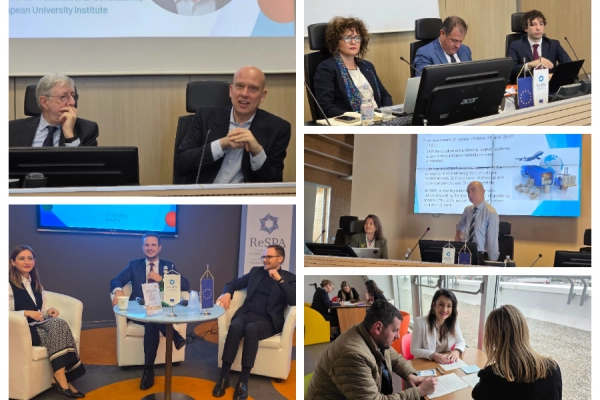
ReSPA and Italian Partners Supports Western Balkans in Deepening Understanding on European Affairs and Negotiation, EU Single Market and HRMD
16-17 April 17 2025, Bari, Italy
Regional leaders and experts gathered for two days under the first cycle of the this year’s capacity building and mobility programme “Towards a Shared European Administrative Space: Connecting Western Balkans with the Italian Administration”, co-organized by ReSPA and Italy’s National School of Administration (SNA) and funded by the Italian Ministry of International Affairs and Cooperation.
After Opening Conference, over two days, three streams delved into various topics at the workshop held at the Puglia Region Headquarters.
European Affairs and Integration Stream drove public officials and EU integration professionals from across the Western Balkans through geopolitical context and mastery of negotiation:
Day 1 – European Integration in the Geopolitical Context
The event began with welcome remarks from a ReSPA Director and Ambassador Massimo Gaiani, Head of European and International Affairs at SNA, who emphasised the shared vision of a united and resilient Europe.
The opening session, “Zooming in,” featured Vanessa Ioannou, National Contact Point for Twinning and TAIEX at the Italian Ministry of Foreign Affairs, who highlighted the critical role of administrative capacity building in EU enlargement from Italy’s perspective.
In the “Zooming out” panel, participants heard from two distinguished voices on the geopolitical climate shaping EU enlargement:
- Professor Fabrizio Tassinari of the Florence School of Transnational Governance explored the broader geopolitical pressures influencing enlargement.
- Bojana Zorić, from the European Union Institute for Security Studies, examined how the current geopolitical moment impacts the EU’s 2024–2029 strategic agenda.
Forward-looking panel on digital transformation in EU integration provided insights on Can Artificial Intelligence Facilitate the EU Accession Process?” by Marina Manzioni (DG JRC – Public Sector Tech Watch), and Eriselda Cobo (Director of EU Integration at Albania’s Prime Minister Office) who shared Albania’s AI strategies in the accession process.
Mauro Novello, Coordinator of the Joint Secretariat for the Interreg IPA South Adriatic Programme, showcased regional success stories under the theme “Puglia Region & Cooperation.”
The evening wrapped up with a fireside chat featuring Predrag Zenović, Montenegro’s Chief Negotiator with the EU, offering candid insights into the accession process to the participants of all three streams.
Day 2 – Mastering the Art and Craft of Negotiations
The second day was fully devoted to mastering EU negotiation skills. Mr. Zenovic introduced the day with reflections on negotiation as both art and discipline. This was followed by a highly interactive simulation exercise led by Professor Alain Lempereur of the Florence School of Transnational Governance. The exercise spanned the entire day and provided participants with hands-on experience in negotiation scenarios mirroring real EU accession talks.
EU Single Market Stream aimed to strengthen the knowledge and capacities of Western Balkan administrations on EU market integration, legislative alignment, and quality infrastructure:
Day 1 – Foundations and Future Directions of the Single Market
The program opened an introduction to the European Single Market, led by Professor Pietro Manzini of SNA and the University of Bologna, whose session provided an in-depth overview of the four freedoms — the free movement of goods, services, persons, and capital — and covered legal harmonization, mutual recognition principles, and the application of EU trade laws, including antidumping measures. Professor Manzini also explored the strategic insights of the Draghi Report, a key document shaping the economic and industrial priorities of the new Von der Leyen Commission, addressing Europe’s innovation challenges, the balance between industrial competitiveness and decarbonization, and the EU’s efforts to reduce reliance on external sources for strategic materials.
Ilir Rexha, a GIZ expert, focused on Capacity Building for Quality Infrastructure Stakeholders, highlighting how strengthening quality infrastructure is a vital step for the Western Balkans to achieve deeper integration into the EU Single Market.
Day 2 – EU Accession and Market Integration
The second was followed by a detailed session by Professor Branko Radulović (University of Belgrade) on the link between the Single Market and EU accession negotiations. He emphasized the significance of aligning national legislation with EU market laws, especially within Cluster 2 of the accession framework.
The event closed with a session led by Zdravko Ilic, Senior Expert for Trade in Services at CEFTA. His interactive discussion, “Integration of Candidate States into the European Single Market”, tied together topics from both days and encouraged dialogue on national efforts within the Stabilisation and Association Agreements, the Common Regional Market, and the EU Growth Plan.
HRM and Performance Appraisal Stream underscored the strategic importance of human capital and the role of innovation in building capable, digitally proficient public services:
Valentina Albano, from the Office for Innovation, Training & Skills Development, opened the sessions with a presentation on “The New Training Directive of the Minister for Public Administration”, outlining Italy’s renewed commitment to continuous learning and skill-building in the public sector.
Nicolò Acciai, from the Office for Public Employment & Organisation, introduced “The HRM Toolkit for Public Service and Human Resource Management”, showcasing practical tools for effective personnel management.
Sabrina Bandera, Head of Research, Innovation, and Strategy at SNA, explored “Competency Frameworks and Assessment of Competencies”, emphasizing the role of structured evaluation in developing high-performing public servants.
Francesco Tortora and Giuseppe Rossi, from the Office for Public Competitions and Recruitment, presented on “Innovative Policies to Attract, Recruit and Retain Young Talents”, offering solutions to address talent shortages in both central and local governments.
Camilla Landi, from the Office for Quality of Performance and Reforms, delivered insights on “Performance Appraisal in Italian Public Administration”, focusing on the importance of measurable outcomes in public service delivery.
The day concluded with a forward-looking session by Sabrina Bandera, who returned to the stage to discuss the “Use of AI in Public Administration Training”, underlining the transformative potential of artificial intelligence in civil servant development.
This event served as a cornerstone in enhancing administrative cooperation between Italy and the Western Balkans, promoting a culture of transparency, innovation, and shared European values in public sector management.



